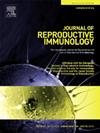活化的CD8(+)组织驻留记忆T细胞影响轻度/轻度子宫内膜异位症的子宫内膜容受性
IF 2.9
3区 医学
Q3 IMMUNOLOGY
引用次数: 0
摘要
子宫内膜免疫紊乱为子宫内膜异位症的胚胎着床创造了一个不适宜的子宫内膜环境。CD8 + 组织常驻记忆T细胞(CD8 +TRM)是子宫内膜中丰富的组织常驻免疫细胞,但CD8 +TRM对子宫内膜异位症子宫内膜容受性的影响尚不清楚。我们收集子宫内膜组织,通过流式细胞术探讨CD8 +TRM在子宫内膜异位症和对照组异位子宫内膜中的数量和功能。然后我们将CD8 +TRM与子宫内膜基质细胞(ESCs)共培养,探讨CD8 +TRM对ESCs中子宫内膜容受性标志物表达的影响。接下来,我们建立小鼠模型,寻找CD8 +TRM的数量和功能,并在体内寻找其免疫干预靶点。我们发现在分泌期,子宫内膜异位症患者的细胞毒性、去肉芽和CD8 +TRM表达的炎症细胞因子高于对照组。CD8 +TRM抑制共培养体系中ESCs HOXA10、FOXO1、IGFBP-1和PRL的表达。阻断IFN-γ后,ESCs中HOXA10、FOXO1、IGFBP-1和PRL的表达均有所提高。子宫内膜异位症小鼠模型CD8 +TRM的数量、细胞毒性和炎性细胞因子的表达均高于假手术对照组。腹腔注射抗ifn -γ或抗cd8 α后,子宫内膜容受性细胞表达增加。这些结果表明,CD8 +TRM参与子宫内膜促炎免疫微环境,影响子宫内膜异位症患者和子宫内膜异位症小鼠模型异位子宫内膜容受性和去个体化标志物的表达。CD8 +TRM及其IFN-γ分泌可能是子宫内膜异位症子宫内膜容受性缺陷的免疫治疗靶点。本文章由计算机程序翻译,如有差异,请以英文原文为准。
Activated CD8(+) tissue-resident memory T cells impact the endometrial receptivity in minimal/mild endometriosis
Endometrial immune disorders create an inhospitable endometrial environment for embryonic nidation in endometriosis. CD8 + tissue resident memory T cells (CD8 +TRM) are abundant tissue resident immune cells in endometrium, but the effect of CD8 +TRM on endometrial receptivity of endometriosis remains unexplored. We collected endometrium tissue to explore the number and function of CD8 +TRM in eutopic endometrium of endometriosis and controls through flow cytometry. Then we co-cultured CD8 +TRM with endometrial stromal cells (ESCs) to explore the influence of CD8 +TRM on the expression of endometrial receptivity markers in ESCs. Next, we established mice models to find the number and function of CD8 +TRM and find immune intervention target of it in vivo. We found that the cytotoxicity, degranulation, and inflammatory cytokine expressed by CD8 +TRM were higher in endometriosis patients than in controls during secretory phase. CD8 +TRM inhibited the expression of HOXA10, FOXO1, IGFBP-1 and PRL of ESCs in a co-culture system. The expression of HOXA10, FOXO1, IGFBP-1 and PRL of ESCs were improved when blocking IFN-γ. And the number of CD8 +TRM and its cytotoxicity and expression of inflammatory cytokine were higher in endometriosis mice models than sham operation controls. After intraperitoneal injected anti-IFN-γ or anti-CD8α, the expression of endometrial receptivity makers was increased. These findings demonstrated that CD8 +TRM participate in the pro-inflammatory endometrial immune microenvironment and affect the expression of endometrial receptivity and decidualization markers in the eutopic endometrium of endometriosis patients and endometriosis mice models. CD8 +TRM and its IFN-γ secretion could be probably immunotherapeutic target for defective endometrial receptivity of endometriosis.
求助全文
通过发布文献求助,成功后即可免费获取论文全文。
去求助
来源期刊
CiteScore
6.30
自引率
5.90%
发文量
162
审稿时长
10.6 weeks
期刊介绍:
Affiliated with the European Society of Reproductive Immunology and with the International Society for Immunology of Reproduction
The aim of the Journal of Reproductive Immunology is to provide the critical forum for the dissemination of results from high quality research in all aspects of experimental, animal and clinical reproductive immunobiology.
This encompasses normal and pathological processes of:
* Male and Female Reproductive Tracts
* Gametogenesis and Embryogenesis
* Implantation and Placental Development
* Gestation and Parturition
* Mammary Gland and Lactation.

 求助内容:
求助内容: 应助结果提醒方式:
应助结果提醒方式:


